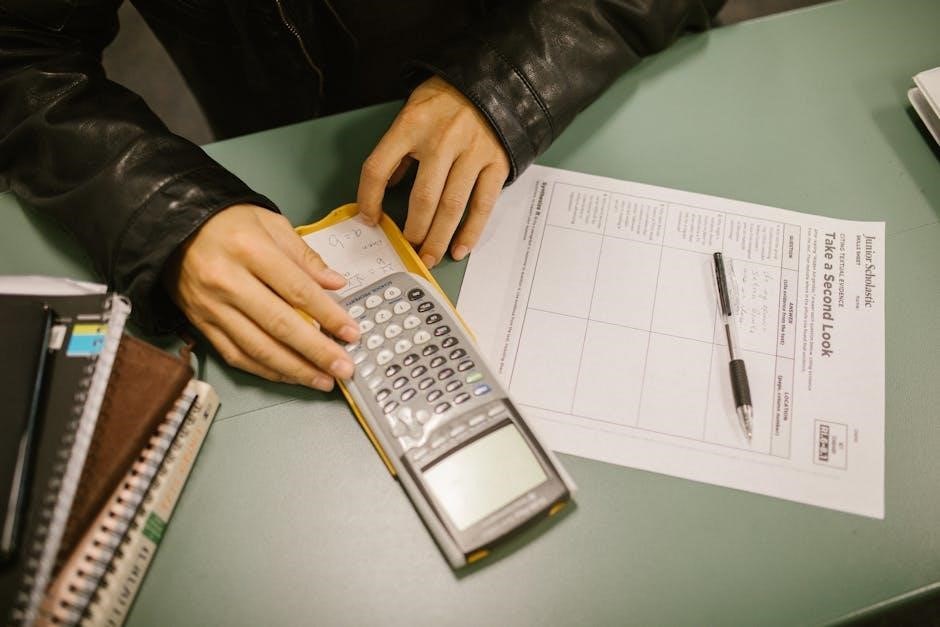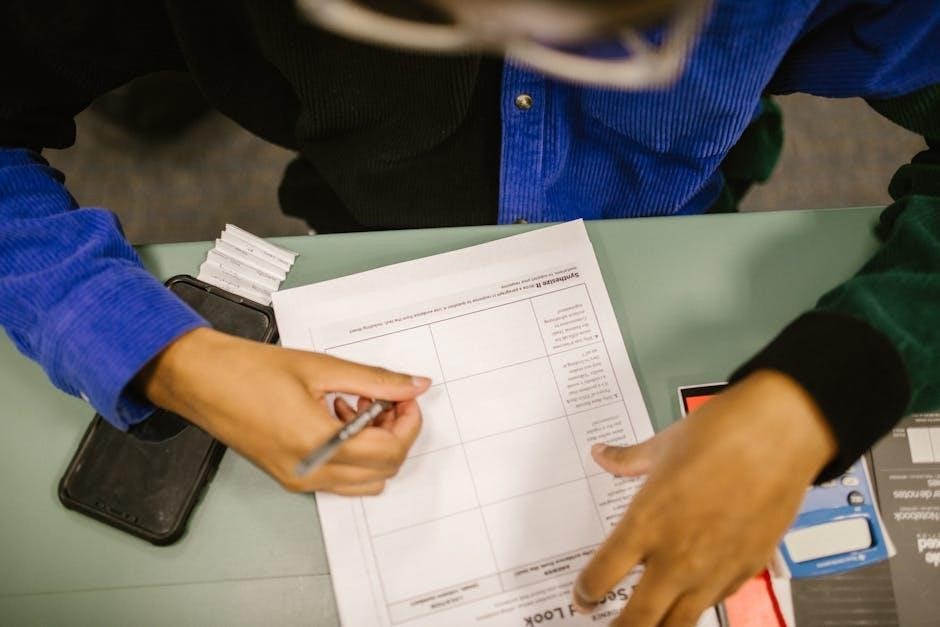Year 9 maths tests are essential assessments evaluating students’ understanding of key concepts. They cover various topics‚ including algebra‚ geometry‚ and statistics‚ aligning with curriculum standards.
1.1. Overview of Year 9 Maths Curriculum
The Year 9 maths curriculum focuses on building foundational skills in algebra‚ geometry‚ and statistics. It emphasizes problem-solving‚ critical thinking‚ and real-world applications. Students explore number systems‚ trigonometry‚ and probability‚ preparing them for higher-level maths. The curriculum aligns with national standards‚ ensuring comprehensive coverage of essential topics. Regular assessments‚ like tests with answers in PDF format‚ help track progress and understanding.
1.2. Importance of Practicing Past Papers
Practicing past papers is crucial for exam success. It familiarizes students with test formats‚ question types‚ and time management. Solving previous years’ questions helps identify weaknesses and improves problem-solving skills. Year 9 maths test papers with answers in PDF provide a convenient way to revise and understand concepts thoroughly. Regular practice boosts confidence and ensures readiness for actual exams.

Structure of a Year 9 Maths Test
Year 9 maths tests typically include multiple-choice and short-answer questions. They assess knowledge across number systems‚ algebra‚ geometry‚ and statistics. Tests may allow calculators and provide answer sheets for clarity. Time limits vary‚ but often range from 60 to 90 minutes‚ ensuring comprehensive evaluation of students’ mathematical skills and problem-solving abilities.
2.1. Time Allowed and Exam Format
Year 9 maths tests typically have a time limit of 60 to 90 minutes‚ depending on the exam format. Students are often required to complete multiple-choice and short-answer questions within this timeframe. Non-calculator sections may be included to assess mental maths skills. Tools like calculators‚ pens‚ and protractors are usually allowed. The format ensures a fair assessment of mathematical understanding and problem-solving abilities under timed conditions.
2.2. Types of Questions (Multiple-Choice‚ Short Answer)
Year 9 maths tests feature multiple-choice questions that assess quick recall and comprehension‚ while short-answer questions require detailed problem-solving. Multiple-choice options provide clear choices‚ minimizing errors‚ while short-answer sections evaluate the depth of understanding. Both formats ensure a comprehensive assessment of mathematical skills and conceptual knowledge. This dual approach helps in identifying strengths and areas needing improvement‚ providing a balanced evaluation.
Year 9 maths tests cover essential topics like number systems‚ algebra‚ geometry‚ trigonometry‚ statistics‚ and probability. These areas form the core of the curriculum‚ ensuring comprehensive assessment. Number systems and algebra are fundamental in Year 9 maths tests. Students explore rational numbers‚ integers‚ and algebraic expressions. Practice tests‚ like those in PDF format‚ provide ample questions on solving equations‚ simplifying expressions‚ and interpreting numerical data. These exercises help build a strong foundation for advanced mathematical concepts and problem-solving skills. Regular practice ensures mastery of these essential topics. Geometry and trigonometry questions in Year 9 maths tests involve properties of shapes‚ angles‚ and spatial reasoning. Practice tests include problems on calculating areas‚ volumes‚ and using trigonometric ratios. PDF resources provide detailed solutions‚ helping students understand how to apply geometric principles to real-world problems. Regular practice with these concepts enhances spatial awareness and analytical thinking. Statistics and probability questions assess data interpretation and chance events. Year 9 tests include analyzing graphs‚ calculating probabilities‚ and understanding distributions. PDF resources offer practice questions with answers‚ aiding students in mastering concepts like mean‚ median‚ and probability calculations. Regular practice helps build confidence in applying statistical methods and probabilistic reasoning to solve real-world problems effectively. Effective preparation involves consistent practice‚ focusing on weak areas‚ and using resources like PDF tests for revision. Regular study and seeking help improve performance. To excel in Year 9 maths tests‚ establish a structured study routine. Dedicate specific times for each topic‚ ensuring thorough understanding. Utilize past papers and PDF resources to identify weak areas. Regularly review and practice problems‚ focusing on accuracy and speed. Incorporate active learning techniques‚ such as solving problems without notes‚ to reinforce concepts. Consistency and organization are key to achieving success. Leverage online resources and practice tests to enhance preparation for Year 9 maths exams. Websites offer downloadable PDFs with questions and answers‚ mirroring actual test formats. Utilize these tools to identify strengths and weaknesses‚ track progress‚ and refine problem-solving skills. Regularly attempting timed practice tests builds exam confidence and improves time management‚ ensuring readiness for the actual assessment. The Year 9 Maths Test with Answers PDF is a valuable resource for students‚ providing practice questions and solutions. It covers key topics like algebra‚ geometry‚ and statistics‚ helping students assess their understanding and prepare effectively for exams. The PDF format allows easy access and printing‚ making it a convenient study aid. Using PDF format for Year 9 maths tests offers numerous advantages. PDFs are easily accessible‚ printable‚ and maintain consistent formatting across devices. They provide a portable and reliable way to study‚ allowing students to practice anytime‚ anywhere. Additionally‚ PDFs often include answers and mark schemes‚ enabling self-assessment and improving understanding of concepts. This format is ideal for both students and educators‚ enhancing test preparation and revision efficiency. Reliable Year 9 maths test PDFs can be found on official education websites‚ school portals‚ and trusted online platforms. Many educational institutions and teachers share these resources freely. Additionally‚ platforms offering curriculum-aligned tests provide comprehensive coverage of topics‚ ensuring effective preparation. These PDFs are often downloadable for free‚ making them accessible to students and educators alike for seamless test preparation. Common challenges include time management and understanding difficult concepts‚ which can hinder performance. These issues can be addressed with thorough preparation and practice. Effective time management is crucial during Year 9 maths tests. Allocate 5 minutes to read instructions and plan your approach. Spend 10-15 minutes on each section‚ prioritizing high-mark questions. Avoid spending too long on difficult problems; use elimination for multiple-choice. Keep 5 minutes to review answers‚ ensuring all questions are attempted. Practice under timed conditions to build efficiency and reduce exam stress. Struggling with complex maths concepts is common in Year 9. To overcome this‚ students should consult teachers or maths clubs for clarity. Utilize online resources‚ such as video tutorials and practice tests‚ to reinforce learning. Break down challenging problems into simpler steps and regularly review weak areas. Consistent practice helps solidify understanding and builds confidence in tackling difficult topics effectively. The mark scheme provides detailed scoring criteria‚ while the answer key offers correct solutions. Both tools help students identify errors and understand expectations for each question. The mark scheme outlines the criteria for awarding marks‚ helping students understand how their answers are graded. It provides a detailed breakdown of marks allocated to each question part‚ ensuring transparency. By comparing their answers with the answer key‚ students can identify errors and gaps in their understanding. This process helps refine study strategies and improves future performance effectively.
Analyzing your answers helps identify strengths and weaknesses. Reviewing correct responses reinforces understanding‚ while errors highlight areas needing improvement. Comparing your work with the mark scheme and answer key provides insights into common mistakes. This reflective process enables targeted revision‚ ensuring better preparedness for future tests and fostering a deeper grasp of mathematical concepts and problem-solving techniques. Year 9 maths tests are designed to align with the Australian Curriculum‚ ensuring comprehensive coverage of key topics and skills. They assess understanding and application of mathematical concepts. Year 9 maths tests are crafted to meet Australian Curriculum standards‚ ensuring assessments evaluate essential skills and knowledge. Each test aligns with specific learning outcomes‚ providing a clear measure of student understanding. The inclusion of varied question types‚ such as multiple-choice and open-response‚ ensures a comprehensive evaluation of mathematical proficiency and problem-solving abilities. This alignment guarantees that students are well-prepared for further studies. Year 9 maths tests are designed to cover all key areas of the curriculum‚ ensuring students are assessed on a wide range of skills and knowledge. Each test includes questions from topics like algebra‚ geometry‚ and statistics‚ providing a balanced evaluation. Practice tests often feature questions from each topic‚ helping students identify gaps in their understanding and prepare thoroughly for exams. This comprehensive approach ensures no area is overlooked. Technology plays a crucial role in maths test preparation‚ with calculators and protractors aiding calculations and geometric measurements. Online tools and practice platforms enhance problem-solving skills and understanding. Calculators and protractors are essential tools for Year 9 maths tests‚ aiding in accurate calculations and geometric measurements. They save time during exams‚ allowing students to focus on complex problems. Regular practice with these tools ensures familiarity and confidence. Proper use aligns with curriculum standards‚ enhancing problem-solving skills and understanding of mathematical concepts. Online tools offer interactive resources for Year 9 maths practice‚ providing access to downloadable PDF tests and answer keys. These tools enable students to revise topics like algebra‚ geometry‚ and statistics effectively. They also include features for self-assessment and tracking progress‚ ensuring comprehensive preparation. Regular use of these tools helps identify weak areas and improves problem-solving skills‚ aligning with curriculum standards for a strong foundation. Maths concepts from Year 9 tests are applied to real-world problems‚ such as budgeting‚ engineering‚ and data analysis. These applications highlight the practical relevance of learning. Maths concepts learned in Year 9 are crucial for solving everyday problems‚ such as calculating expenses‚ measuring materials‚ and understanding statistics. These skills enable students to make informed decisions in real-life scenarios‚ demonstrating the practical value of mathematics. Regular practice with test questions helps reinforce these applications‚ preparing students for both academic and personal challenges. Year 9 maths tests focus on developing critical thinking and problem-solving abilities. By tackling various question types‚ students enhance their capacity to approach challenges methodically. These skills are transferable to real-world situations‚ enabling effective decision-making and analytical thinking. Regular practice strengthens these abilities‚ ensuring students are well-prepared for academic and practical challenges. Effective revision involves creating structured study plans and focusing on weak areas. Regular practice with past papers and seeking feedback are crucial for improvement. Developing a structured study schedule is key to effective revision for Year 9 maths tests. Allocate specific times for each topic‚ ensuring balanced coverage of algebra‚ geometry‚ and statistics. Use past papers to identify weak areas and dedicate extra time to those sections. Regular practice with timed sessions helps build exam stamina and time management skills. Consistency is crucial for steady progress. Identifying and addressing weak areas in maths is vital for improvement. Review past test results to pinpoint where mistakes occurred. Focus on understanding difficult concepts through additional practice questions and explanations. Regularly revisit these areas to reinforce learning and build confidence. Targeted effort ensures a well-rounded understanding and better performance in Year 9 maths tests. Seeking help and feedback is crucial for improving maths skills. Teachers‚ maths clubs‚ and peers provide valuable insights‚ clarifying doubts and enhancing problem-solving abilities. Regular interaction fosters growth. Consulting teachers or joining maths clubs offers personalized guidance‚ helping students address specific weaknesses. Teachers provide detailed explanations‚ while maths clubs foster collaborative learning. Regular interactions ensure doubts are clarified promptly‚ improving understanding and confidence. These resources are invaluable for excelling in Year 9 maths tests and achieving academic success. Peer learning and group study enhance problem-solving skills by encouraging collaborative effort. Students discuss challenging concepts‚ share insights‚ and learn from one another’s strengths; Group study sessions foster a supportive environment‚ allowing individuals to clarify doubts and gain confidence. This collective approach not only strengthens understanding but also prepares students effectively for Year 9 maths tests. Consistent practice and staying calm are crucial for success. Utilize PDF resources for revision and focus on understanding concepts thoroughly to build confidence and achieve top results. Staying calm and confident is vital for optimal performance in Year 9 maths tests. Students should practice relaxation techniques‚ such as deep breathing‚ to manage exam anxiety. Building confidence through consistent practice and understanding of concepts helps students approach the test with a positive mindset‚ leading to better problem-solving skills and overall results. Regular revision using PDF resources ensures familiarity with question formats‚ reducing stress during the exam. Encouraging a growth mindset and focusing on progress rather than perfection also plays a significant role in maintaining confidence. Additionally‚ discussing concerns with teachers or peers can provide reassurance and clarity‚ further enhancing a student’s ability to stay calm and composed during the test. By cultivating these habits‚ students can perform at their best and achieve their full potential. Continuous practice is key to excelling in Year 9 maths tests. Regularly solving past papers and PDF resources helps build familiarity with question formats and reinforces key concepts. Reviewing mistakes and understanding solutions enhances problem-solving skills. Consistent effort ensures steady progress‚ while focusing on weak areas strengthens overall performance. Utilizing online tools and practice tests further solidifies understanding‚ leading to improved confidence and results.
Key Topics Covered in Year 9 Maths Tests
3.1. Number Systems and Algebra
3.2. Geometry and Trigonometry
3.3. Statistics and Probability

Preparation Tips for Year 9 Maths Tests
4.1. Effective Study Habits and Revision Strategies
4.2. Using Online Resources and Practice Tests
5.1. Benefits of Using PDF Format for Tests
5.2. Where to Find Reliable Year 9 Maths Test PDFs

Common Challenges in Year 9 Maths Tests
6.1. Time Management During the Exam
6.2. Understanding Difficult Concepts
Mark Scheme and Answer Key
7.1. How to Interpret the Mark Scheme
7;2. Learning from Your Answers

Aligning Tests with the Australian Curriculum
8.1. Curriculum Standards and Assessment
8.2. Ensuring Comprehensive Coverage of Topics

Role of Technology in Test Preparation
9.1. Using Calculators and Protractors
9.2. Online Tools for Maths Practice

Real-World Applications of Maths Concepts
10.1. Applying Maths to Everyday Problems
10.2. Building Problem-Solving Skills

Revision Strategies for Year 9 Maths Tests
11.1. Creating a Study Schedule
11.2. Focusing on Weak Areas

Importance of Seeking Help and Feedback
12.1. Consulting Teachers or Maths Clubs
12.2. Peer Learning and Group Study
Final Tips for Success in Year 9 Maths Tests
13.1. Staying Calm and Confident
13.2. Continuous Practice and Improvement

